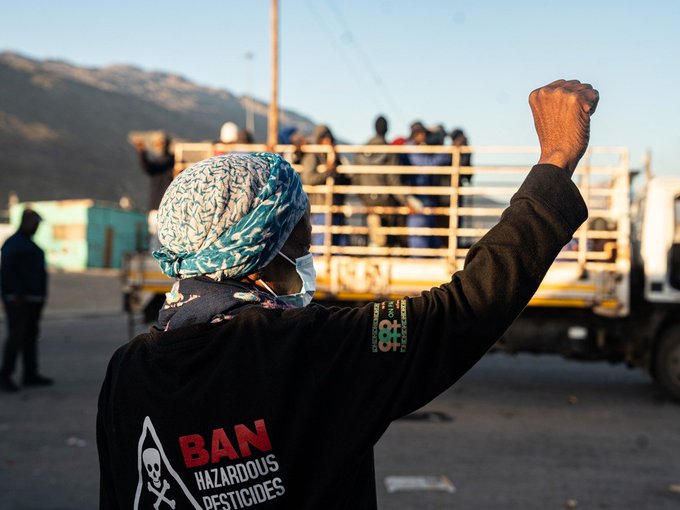A feminist organization, Women on Farms Project (WFP), is advocating for tighter regulations on the use of pesticides in South African agriculture. The group accuses some farmers of disregarding protocols and legal frameworks meant to ensure the safe use of such chemicals.
This weekend, Women on Farms Project will host the South African People’s Tribunal on AgroToxins, an event aimed at shedding light on the dangers of pesticide exposure for farmworkers and the general public.
Alarming Concerns About Toxic Pesticides
The use of hazardous pesticides in farming is a growing concern, especially among farmworkers, who are directly exposed to these chemicals on a daily basis.
Kara Mackay, a representative of Women on Farms Project, emphasized that pesticide exposure is not just a farmworkers’ issue, but a public health crisis.
“For the public, we also want to put a notice that the food that we are eating is poisoned with highly hazardous pesticides,” Mackay stated.
Women on Farms Project
She explained that farmworkers face direct exposure, often without proper safety measures, while the general population is micro-exposed through food consumption.
“We feel that this is a collective issue we all need to recognize and change,” she added.
The South African People’s Tribunal on AgroToxins
To address these concerns, Women on Farms Project is organizing the South African People’s Tribunal on AgroToxins this weekend.
The tribunal will be presided over by respected experts, including:
-
Judge Navi Pillay, a former United Nations High Commissioner for Human Rights
-
Dr. Sophia Kisting-Cairncross, a renowned occupational health expert
-
Philile Ntuli, a Human Rights Commissioner
The goal of the tribunal is to hold public discussions and gather testimonies on the negative effects of pesticide use in agriculture.
Health Risks Faced by Farmworkers
Farmworkers are among the most vulnerable groups affected by pesticide exposure. Many work in conditions where they are:
-
Not provided with protective gear
-
Not properly informed about the risks of handling toxic chemicals
-
Exposed to pesticides through direct contact, inhalation, and contaminated water
Studies have linked long-term pesticide exposure to respiratory illnesses, skin diseases, reproductive health issues, and even cancer.
Despite existing laws regulating the use of highly hazardous pesticides, Women on Farms Project argues that many farmers ignore these regulations, placing profit over safety.
The Public’s Role in Addressing the Issue
While farmworkers face the most immediate risks, Mackay stressed that pesticide exposure affects all South Africans.
Consumers unknowingly consume pesticide-contaminated produce, as many fruits and vegetables on the market are treated with hazardous chemicals.
By raising awareness, Women on Farms Project hopes that:
-
Consumers will demand stronger regulations on pesticide use
-
The government will enforce existing laws more strictly
-
Farmers will be held accountable for unsafe pesticide practices
The Call for Stricter Regulations
Women on Farms Project is pushing for a complete overhaul of pesticide regulation policies in South Africa.
The organization is calling for:
-
A ban on highly hazardous pesticides that pose serious health risks
-
Stronger enforcement of existing laws on pesticide usage
-
Greater transparency from farmers regarding the chemicals they use
-
Improved safety measures for farmworkers, including protective clothing and training
Looking Ahead: A Healthier Future for South African Agriculture
The South African People’s Tribunal on AgroToxins is expected to spark important discussions on the dangers of pesticide use and the need for better protections for both farmworkers and consumers.
As Women on Farms Project continues to advocate for change, their efforts highlight the urgency of addressing pesticide-related health risks and ensuring that South Africa’s food supply remains safe for all.

